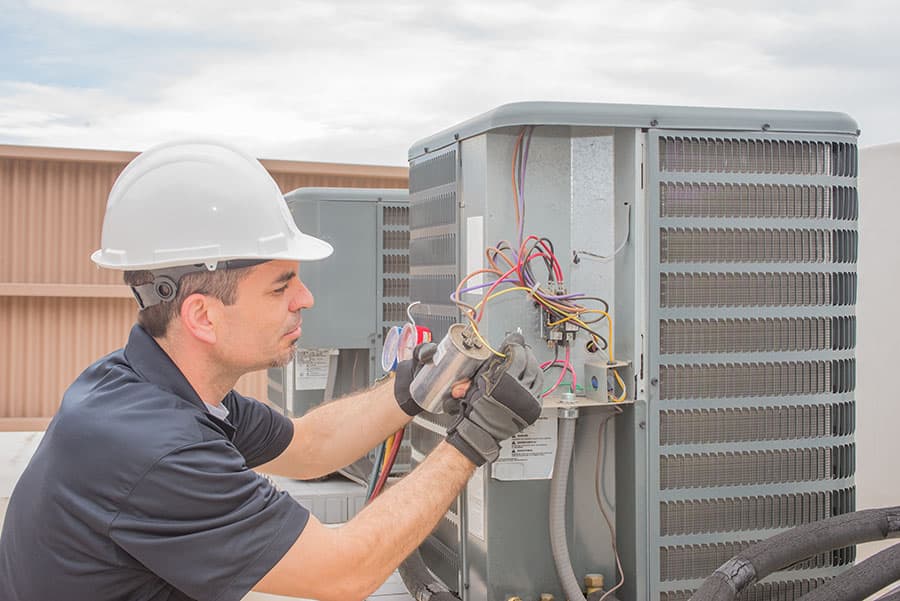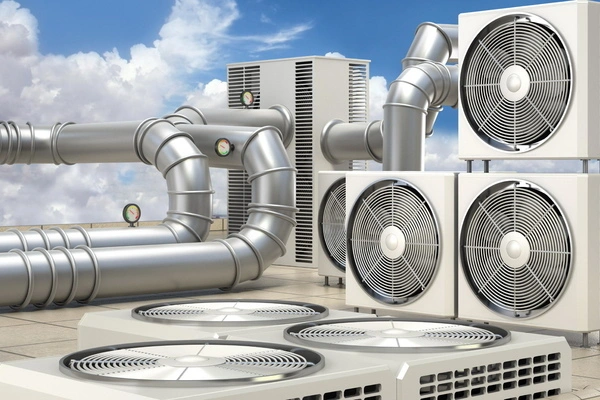Checking Out the Important Components of an Efficient A/c System
An efficient heating and cooling system is constructed on numerous vital parts that operate in consistency. Each component, from the thermostat to the ductwork, plays a necessary role in maintaining convenience and energy efficiency. Comprehending these components is critical for maximizing efficiency and boosting interior air quality. As one analyzes these components, the detailed relationships in between them disclose insights right into enhancing general system efficiency. What certain variables add most to this efficiency?
The Role of the Thermostat in Heating And Cooling Effectiveness
Frequently overlooked, the thermostat plays a critical function in the performance of Cooling and heating systems. This little device works as the primary nerve center, managing temperature settings and ensuring ideal convenience within a space. By properly noticing the ambient temperature level, the thermostat communicates with the air flow, air, and heating conditioning systems to preserve the preferred environment
An efficient thermostat minimizes power intake by activating the HVAC system just when necessary, thus stopping excessive home heating or air conditioning. Modern programmable and smart thermostats boost this efficiency additionally by permitting customers to set schedules and from another location change settings, adapting to day-to-day regimens.
In addition, the placement of the thermostat is crucial; improper area can lead to incorrect temperature level analyses, resulting in inefficient operation. In general, a well-functioning thermostat not only boosts convenience yet additionally adds substantially to power financial savings and the durability of the HVAC system.
Comprehending the Significance of Air Filters
Air filters serve a vital function in heating and cooling systems by ensuring that the air flowing within a room stays clean and healthy and balanced. These filters trap dirt, allergens, and various other toxins, avoiding them from being recirculated throughout the environment. By recording these particles, air filters add to improved interior air quality, which can considerably benefit occupants' wellness, specifically those with allergic reactions or breathing conditions.
In addition, keeping tidy air filters enhances the performance of cooling and heating systems. Blocked filters can restrict air flow, causing the system to work more difficult to maintain preferred temperatures, resulting in increased power consumption and greater utility bills. Routinely changing or cleaning filters is an essential upkeep action that can extend the lifespan of HVAC devices. Ultimately, comprehending the significance of air filters allows property owners and structure managers to take proactive steps to guarantee a well-functioning, efficient heating and cooling system that promotes a comfortable and risk-free indoor setting.

The Functionality of the Heater and Heatpump
Furnaces and heatpump are important components of cooling and heating systems, liable for providing heat during chillier months. Heating systems operate by home heating air through combustion or electrical resistance, then distributing it throughout the home by means of air ducts. They normally provide fast home heating and can be fueled by gas, electricity, or oil, depending upon the system kind.
Conversely, heatpump transfer heat as opposed to create it. They draw out warm from the outdoors air or ground, also in low temperature levels, and transfer it indoors. HVAC experts. This double capability enables heatpump to additionally give air conditioning in warmer months, making them versatile choices for year-round environment control
Both systems need correct maintenance to ensure performance and long life. While furnaces master extreme chilly, heatpump can be beneficial in moderate climates. Understanding their distinct capabilities help property owners in choosing one of the most ideal alternative for their home heating requires.
Discovering the Cooling Device
The cooling system is a vital component of heating and cooling systems, offered in different kinds to fit different needs. Recognizing the performance rankings of these systems is necessary for making educated options concerning power consumption and expense. This section will certainly check out the diverse kinds of a/c unit and clear up how effectiveness scores effect performance.
Kinds of Air Conditioners
While different aspects influence the selection of a/c systems, understanding the different kinds offered is vital for property owners and building supervisors alike. Central air conditioners are designed to cool entire homes or structures, utilizing a network of air ducts for air flow. Window systems use a more localized service, ideal for solitary areas or little rooms. Portable air conditioning system offer flexibility, permitting users to relocate the unit as required. Ductless mini-split systems are one more choice, combining the efficiency of central systems with the convenience of zoning, as they need no ductwork. Geothermal systems harness the earth's temperature for energy-efficient cooling. Each type features distinct benefits, making informed options important for efficient environment control.

Effectiveness Rankings Clarified
Comprehending efficiency scores is necessary for picking the right a/c unit, as these metrics supply understanding into the system's efficiency and energy usage. One of the most typical ranking for a/c is the Seasonal Power Performance Proportion (SEER), which gauges the cooling output during a normal cooling season split by the complete electrical energy input. A higher SEER shows far better efficiency. Additionally, the Energy Performance Proportion (EER) is used for determining performance under particular conditions. Another crucial metric is the Energy Celebrity qualification, which represents that a device fulfills rigorous power effectiveness standards. By evaluating these ratings, consumers can make educated choices that not only optimize this website convenience yet likewise lower energy expenses and environmental impact.
The Relevance of Ductwork and Air movement
Effective ductwork style and air flow administration play critical duties in the general performance and efficiency of cooling and heating systems. Correct ductwork warranties that conditioned air is distributed evenly throughout a space, minimizing temperature variations and improving convenience. Well-designed ducts reduce resistance to air flow, decreasing the workload on heating and cooling devices and eventually lowering power consumption.
Airflow management entails purposefully putting vents and signs up to boost the circulation of air. This stops common issues such as cool or hot spots, which can happen when airflow is blocked or inadequately balanced. Additionally, the right air duct materials and insulation can better enhance performance by lowering heat loss or gain during air transit.
An effective ductwork system not just adds to power cost savings yet can likewise extend the life expectancy of heating and cooling tools by minimizing unnecessary strain (HVAC experts). Comprehending the importance of ductwork and airflow is necessary for achieving peak Cooling and heating system efficiency.
Regular Maintenance Practices to Improve Efficiency
Normal maintenance practices are crucial for guaranteeing peak efficiency of a/c systems. These techniques include routine examinations, cleaning, and necessary repair services to maintain the system running successfully. Regularly altering air filters is essential, as clogged filters can obstruct air movement and minimize performance. On top of that, specialists must check and clean evaporator and condenser coils to stop getting too hot and power wastage.
Yearly specialist inspections are also recommended, as qualified professionals can identify potential issues before they rise. Oiling relocating components minimizes deterioration, adding to a much longer life-span for the system. Furthermore, making sure that the thermostat works appropriately help in keeping ideal temperature control.
:strip_icc()/GettyImages-1512099092-87093749945241799ea83d87154b40ef.jpg)
Regularly Asked Inquiries
How Usually Should I Change My Thermostat?
Thermostats should commonly be replaced every 5 to ten years, depending upon usage and innovation developments. Normal checks are suggested to assure peak efficiency, particularly if experiencing irregular temperature level control or boosted power expenses.
What Size Air Filter Is Finest for My HVAC System?
The best size air filter for a heating and cooling system varies by unit layout. Typically, it's vital to get in touch with the owner's guidebook or examine pop over to this site the existing filter measurements to ensure peak efficiency and air top quality.
Can I Mount a Warmth Pump Myself?
Setting up a heatpump individually is feasible for proficient individuals, but it calls for expertise of local codes and electric systems. Working with a professional is suggested to ensure proper installation and optimal system performance.
Exactly how Do I Know if My Ductwork Is Effective?
To identify ductwork performance, one must inspect for leaks, step air movement at vents, check insulation quality, and review temperature level distinctions in between supply and return ducts. Specialist analyses can supply comprehensive understandings into overall performance.
What Are Signs My HVAC Requirements Immediate Maintenance?
Indications that an a/c system needs instant upkeep consist of uncommon noises, irregular temperatures, raised power bills, unpleasant smells, and frequent biking. Attending to these issues immediately can prevent more damage and assurance peak system efficiency.
Air filters offer a vital function in Heating and cooling systems by assuring that the air distributing within a space remains tidy and healthy. In addition, maintaining clean air filters enhances the efficiency of A/c systems. Ductless mini-split systems are one more alternative, incorporating the effectiveness of central systems with the ease of zoning, as they need no ductwork. Comprehending effectiveness ratings is important for picking the right air conditioning unit, as these metrics supply insight into the system's efficiency and power usage. The ideal visit this site right here dimension air filter for an A/c system varies by device design.